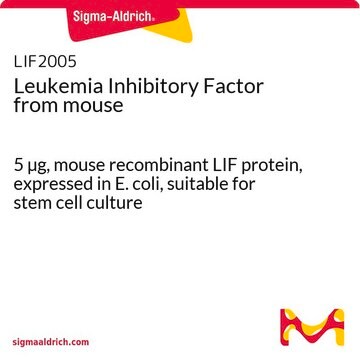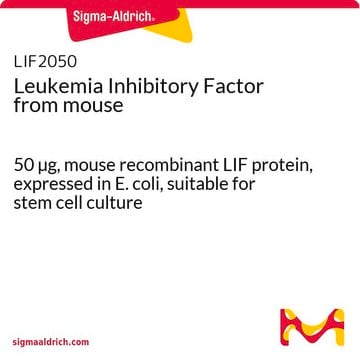LIF2010
Leukemia Inhibitory Factor from mouse
10 µg, mouse recombinant LIF protein, expressed in E. coli, suitable for stem cell culture
Synonym(s):
LIF, Differentiation-stimulating Factor, D Factor, Mouse LIF, Mouse Leukemia Inhibitory Factor, Murine LIF, mLIF
About This Item
Recommended Products
biological source
mouse
Quality Level
Assay
>95% (HPLC and SDS-PAGE)
form
liquid
specific activity
≥1 x 10(E8) U/mg
manufacturer/tradename
Chemicon®
concentration
10 μg/mL
technique(s)
cell culture | stem cell: suitable
impurities
<0.1 ng/mg Endotoxin (of LIF)
input
sample type neural stem cell(s)
sample type mesenchymal stem cell(s)
sample type: mouse embryonic stem cell(s)
sample type hematopoietic stem cell(s)
sample type induced pluripotent stem cell(s)
NCBI accession no.
UniProt accession no.
shipped in
wet ice
Application
M1 Bioassay
1. The M1 bioassay is performed using in vitro semi-solid agar cultures, which contain approximately 100 cells in 1 mL volumes of DME containing 20 % FCS in 0.3% agar.
2. Add 100 μL of sample or mLIF (10(E4) units/mL in 5% FCS in isotonic saline) in two-fold serial dilutions in duplicate to 35 mm petri dishes.
3. Add 100 μL of 5% FCS in isotonic saline to two control slides.
4. Incubate at 37°C in fully humidified atmosphere of 10% CO2 in air for 7 days.
5. Score the number of colonies that show differentiation (note: 50 units is defined as the amount of activity which results in 50% of the colonies being differentiated).
Visit www.esgro-lif.com for additional information
Manufactured by CHEMICON International, Inc. LIF is protected under US Patent nos. 5,187,077, 5,427,925, 5,443,825, 5,750,654 and 6,261,548, European Patent no. 0285 448 and related foreign patents and is not available for resale.
Unit Definition
Analysis Note
Legal Information
Storage Class Code
12 - Non Combustible Liquids
WGK
WGK 1
Flash Point(F)
Not applicable
Flash Point(C)
Not applicable
Certificates of Analysis (COA)
Search for Certificates of Analysis (COA) by entering the products Lot/Batch Number. Lot and Batch Numbers can be found on a product’s label following the words ‘Lot’ or ‘Batch’.
Already Own This Product?
Find documentation for the products that you have recently purchased in the Document Library.
Articles
Leukemia Inhibitory Factor (LIF) is a stem cell growth factor used for the in vitro culture of pluripotent mouse embryonic stem cells (ES cells).
Protocols
Stem Cell protocols for cryopreservation, thawing of cryopreserved stem cells and media preparation.
Related Content
This article shows that a PES membrane containing Stericup Quick Release filter provides an alternative for the pluripotent expansion of embryonic stem cells.
Our team of scientists has experience in all areas of research including Life Science, Material Science, Chemical Synthesis, Chromatography, Analytical and many others.
Contact Technical Service








